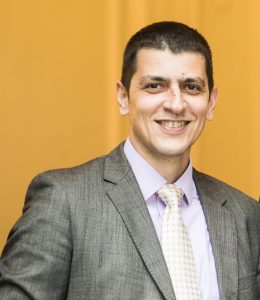Views from ...
How nuclear medicine is leading the fight against cancer
Antonis Kalemis, President of Nuclear Medicine Europe (NMEU)
 People may be surprised to learn that nuclear medicine has been around for more than half a century. Some might assume that it is a new discipline or even a theoretical field of medicine. Nuclear medicine is, however, a well-established and successful industry that is used to help diagnose and treat many different conditions, including cancer. Over the years, we have improved and refined our technologies so that they are safer than ever. We are also much more precise, and we can now provide accurate images of organ functionality and tumours in real-time.
People may be surprised to learn that nuclear medicine has been around for more than half a century. Some might assume that it is a new discipline or even a theoretical field of medicine. Nuclear medicine is, however, a well-established and successful industry that is used to help diagnose and treat many different conditions, including cancer. Over the years, we have improved and refined our technologies so that they are safer than ever. We are also much more precise, and we can now provide accurate images of organ functionality and tumours in real-time.
Nuclear Medicine Europe (NMEU) is the association of most industry players involved in this sector that are active within the EU, from radioisotope suppliers to equipment manufacturers and transporters. We represent their interests in relations with the European Union institutions, ensuring our voice is heard at the highest level amongst decision-makers. We coordinate activities amongst our members, developing broad policy positions. And we also raise awareness about the industry, organising events and communicating with the wider public.
Over the past year, with the coronavirus pandemic affecting so much of our regular activities, we continued to support our members who have been delivering supplies to hospitals and clinics. We can now look ahead to a post-pandemic era of normality. However, cancer is not waiting for COVID to disappear. Every year around 1.3 million people die of cancer in the EU, ie three times as many people as those we have lost to COVID-19.
The EU is addressing this issue through various initiatives, most notably Europe’s Beating Cancer Plan, which recognizes that radiological and nuclear technology is vital and is already helping hundreds of millions of patients across Europe.
We now have to keep up the momentum. This is not just about treating tumours, but about managing the needs of the increasing numbers of cancer survivors. We need investment and resources to diagnose and treat more and better. We need to make sure that Europe continues as the global leader in supplying medical radioisotopes and developing radiological diagnostics and treatments. And we need to continue research on emerging technologies, like personalised medicine, which is based on genetic information.
The European nuclear medicine sector – like the wider nuclear industry – faces several challenges, from negative attitudes towards nuclear energy/radiation, uncertainty over funding in new nuclear energy capacity and management of nuclear waste. There are of course sector-specific issues such as a regulatory environment that needs to acknowledge the special nature of radiopharmaceuticals, a non-coherent reimbursement strategy across member states that it is not fairly covering supply chain costs and big inequalities between member states with respect to access to modern nuclear medicine equipment and applications.
It is also the right moment to further develop links between nuclear medicine and the nuclear industry. It makes sense for NMEU and Foratom to work together on common challenges. Our joint position paper – which will be published soon – recommends that nuclear technology and its non-power applications should be better recognised and supported at EU level. It calls for nuclear to be included in the Next Generation EU recovery plan, for an EU roadmap dedicated to nuclear medicine research, and for the EU to convert to using low enriched uranium (LEU).
These measures can help secure our future. And as nuclear medicine continues to innovate to meet patient needs, we know that the various players in the sector can work with us to promote the many benefits of nuclear technology.
